| Other American Founding Fathers |
| |
| |
| Lot |
Photo |
Description |
Lot 234 |
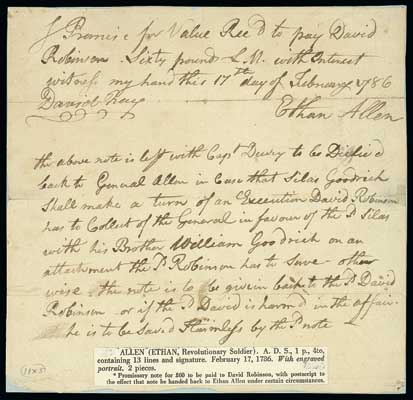 |
Allen, Ethan (1738-1789), Soldier and patriot, formed and led the "Green Mountain Boys" in the Revolutionary War, helped establish the state of Vermont. Autograph Document Signed, one page, 7¼ x 7, no place, February 17, 1786. Promissory note for £60 to one David Robinson. The note is followed by detailed and complicated instructions exactly how the note is to be handled, also entirely in Allen’s hand, in part:
"The above note is left with Capt Dewey to be Dielivd back to General Allen in case that Silas Goodrich shall make a turn of an Execution David Robinson has to collect of the General in favour of P. Silas with his brother William Goodrich…"
Fold separation with early repair on verso, old auction description partly affixed in bottom blank margin, tipped to a backing sheet, Fine and quite rare. In a custom quarter-leather portfolio with historical background and an engraved portrait.
Estimate 3,000 - 4,000
View details and enlarged photo
|
Lot 235 |
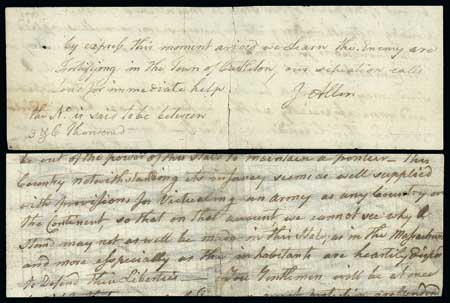 |
Allen, Ira (1751-1814), Soldier and politician, helped frame the Vermont State Constitution*, instrumental in establishing University of Vermont, younger brother of Ethan. Autograph Note Signed, no place, no date [1777], 8 x 2½. On back of a fragment of letter to the State of Massachusetts calling for military assistance, Allen ads this postscript, complete unto itself, in full:
"by express this moment arrived we Learn the Enemy are Fortifying in the Town of Castleton, our situation calls Loud for immediate help. I. Allen.
[P.S.] the N.o is said to be between 3 & 6 Thousand."
On the other side is a portion of the letter, also entirely in Allen’s hand, in full:
"…be out of the power of this State to maintain a frontier. This Country notwithstanding its infancy seems as well supplied with provisions for Victualing [i.e., providing food or other provisions for] an army as any Country on the Continent, so that on that amount, we cannot see why a stand may not as well be made in this State, as in the Massachusetts and more especially as the inhabitants are heartily disposed to Defend their Liberties. You Gentlement will be at once…"
Fine condition, though split in two vertically and rejoined. Enclosed in a custom quarter-leather portfolio with historical background and an engraved portrait.
Estimate 5,000 - 7,500
Expertization: Detailed analysis and letter of authenticity from Charles Hamilton.
According to accompanying documentation, this letter was written shortly after General John Burgoyne’s recapture of Fort Ticonderoga in July of 1777 and as Burgoyne was advancing on Castleton. Allen wrote a nearly identical letter to the State of New Hampshire.
* Vermont declared it’s independence from New Hampshire in 1777 and remained an independent republic until joining the Union in 1791.
View details and enlarged photo
|
Lot 236 |
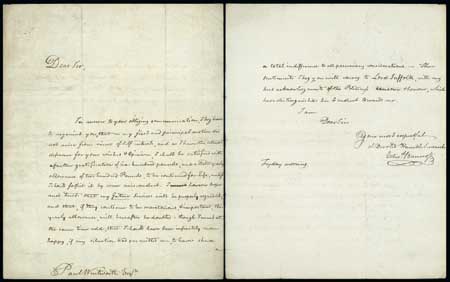 |
Bancroft, Edward (1744-1820), Author, physician, friend of Benjamin Franklin, American spy turned British spy. Revolutionary War-date Autograph Letter Signed, two pages, 7¼ x 9¼ no place, "Fryday morning" [docketed on verso "D.r B___ to M.r__ Wentworth - Friday morning. Feb ______ 1777"]. To "Paul Wentworth Esq.r", British secret agent. In full:
"Dear Sir, In answer to your obliging communication, I beg leave to acquaint you, that as my first and principal motive did not arise from views of self interests, and as I have the utmost deference for your wishes & opinions, I shall be satisfied with a further gratification of six hundred pounds, and a stated yearly allowance of two hundred Pounds, to be continued for Life, unless I should forfeit it by some misconduct. I however hope and trust that my future services will be properly regarded, and that, it they continue to be meritorious, & important, this yearly allowance, will hereafter be doubled: though I must at the same time add, that I should have been infinitely more happy, if my situation had permitted me, to have shewn a total indifference to all pecuniary considerations. These sentiments I beg you will convey to Lord Suffolk, with my best acknowledgments of the Politeness candour & honour, which have distinguished his Conduct towards me. I am, Dear Sir, Your most respectful & Devoted Humble Servant. Edw.d Bancroft"
Fine condition, lightly cleaned and refreshed with just a bit of soiling remaining.
Estimate 2,000 - 3,000
A FASCINATING LETTER WITH A SUPERB ASSOCIATION BETWEEN THE TWO SECRET AGENTS.
Bancroft, at the behest of Benjamin Franklin, had spied for American commissioners in France during the early years of the revolution, passing information about the British to American agents. In 1877 he was approached by Wentworth, a British loyalist living in America, who coordinated agents and informers in Europe. Bancroft accepted Wentworth’s proposal and became a double agent, receiving a salry from the British from 1777 until 1783. He reported Franklin’ movements, as well as the movements of American troops and ships. In 1778 he gave the British advance information of the Franco-American alliance. At one point the British pretended to have Bancroft arrested to protect his cover.
Bancroft’s duplicity was not revealed until 70 years after his death when some British records were published, though there is speculation that Franklin was aware of Bankcroft’s activities and used him to pass false information to the British.
View details and enlarged photo
|
Lot 237 |
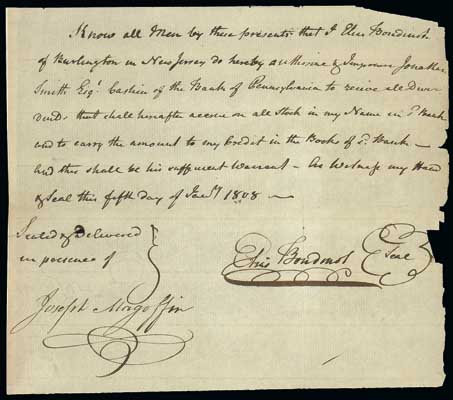 |
Boudinot, Elias (1740-1821), Lawyer, philanthropist, politician from New Jersey, President of the Continental Congress during peace negotiations and ratification of the Treaty of Paris, U.S. Congressman (1789-1795), Director of the U.S. Mint at Philadelphia (1795-1805). Autograph Document Signed, one page, 7¾ x 6¾ Burlington, N.J., January 5, 1808. Power of Attorney given to one Jonathan Smith, Esqr, cashier of the Bank of Pennsylvania, for the purpose of receiving Boudinot’s stock dividends and crediting them to his bank account, boldly signed with flourishes by Boudinot; some chipping in right margin and rejoining of split folds, one of which runs vertically through signature.
Estimate 400 - 600
View details and enlarged photo
|
Lot 238 |
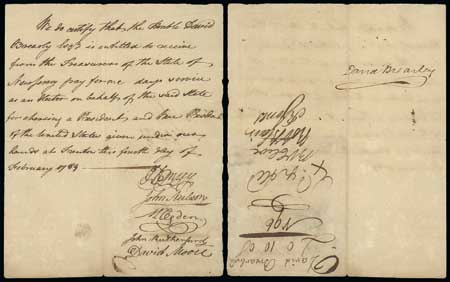 |
Brearly, David (1745-1790), New Jersey delegate to the Constitutional Congress, signer of the U.S. Constitution, lawyer, soldier, judge. Manuscript Document Signed, one page, 6¼ x 7¾ Trenton, N.J., February 4, 1789. In part: "We do certify that the Honorable David Brearley Esq., is entitled to receive from the Treasury of the State of New Jersey pay for one day's service as an Elector on behalf of the said State for choosing a President and Vice President of the United States" Signed by five members of the New Jersey Presidential Election Committee and boldly endorsed with a flourish by Brearley on verso. Fine condition.
Estimate 2,000 - 3,000
AN IMPORTANT HISTORICAL DOCUMENT DIRECTLY INVOLVING THE ELECTION OF GEORGE WASHINGTON AS THE FIRST PRESIDENT OF THE UNITED STATES.
View details and enlarged photo
|
Lot 239 |
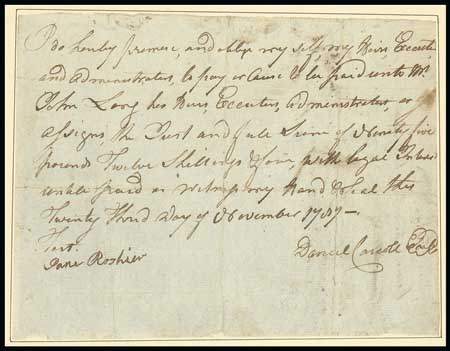 |
Carroll, Daniel (1730-1796), Maryland signer of the U.S. Constitution and of the Articles of Confederation, farmer, politician, U.S. Congressman, commissioner for surveying District of Columbia (1791). Autograph Document Signed, one page, 7½ x 5¾ no place, November 23, 1787. Promissory note in the amount of £95:12:4 to one John Long. On reverse Long has noted receipt of partial payment of £35:10:0 on June 5, 1788 and assigns his interest in the balance to one Horatio Hollingsworth. Neatly inlaid to an overall 10¾ x 7¼ Fine.
Estimate 400 - 600
View details and enlarged photo
|
Lot 240 |
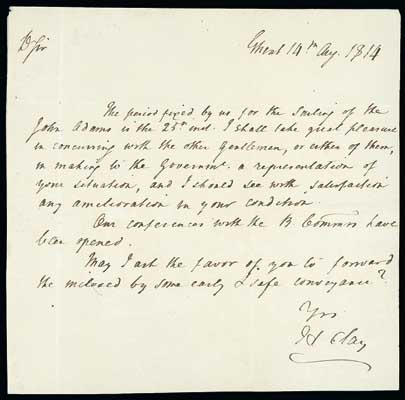 |
Clay, Henry (1777-1852), Statesman and orator, U.S. Senator and Congressman from Kentucky, Secretary of State under John Quincy Adams (1825-1829), three-time unsuccessful Presidential candidate (1824, 1832, 1844), "The Great Compromiser". Autograph Letter Signed, one page, 7 x 7, Ghent [Belgium], August 14, 1814. While representing the United States at peace negotiations with the British after the War of 1812, which resulted in the Treaty of Ghent. Personal letter to an unidentified gentleman, in part: "…Our conferences with the B. Commrs [British Commissioners] have been opened." [negotiations began on August 8] and "May I ask the favor of you to forward the enclosed [not present] by some early & safe conveyance? Yrs, H. Clay". Very Fine condition with a couple small tears, affecting text only slightly, and accompanied by a handsome engraved portrait.
Estimate 750 - 1,000
Along with Clay, then Speaker of the House, the other U.S. negotiators were John Quincy Adams, Albert Gallatin, James Bayard and Jonathan Russell.
View details and enlarged photo
|
Lot 241 |
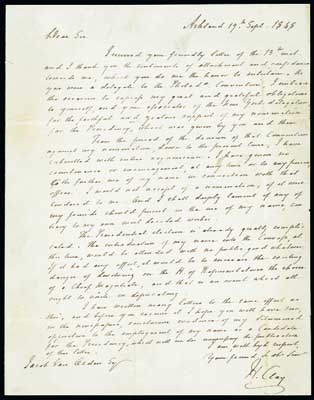 |
Clay, Henry (1777-1852), Autograph Letter Signed, one page, 7¼ x 9¼ Ashland [Lexington, Ky.], September 19, 1848. To "Jacob Van Orden Esqr", a New York Delegate to the Whig Party convention in Philadelphia, thanking the New York delegation for their support and declining a late movement to have his name be placed on the ballot as an independent Whig candidate (the convention had selected Zachary Taylor as their candidate), in part:
"…From the period of the decision of that Convention against my nomination…I have submitted with entire acquiescence. I have given no countenance or encouragement…to the further use of my name in connection with that office. I would not accept of a nomination, if it were tendered to me. And I shall deeply lament if any of my friends should persist in the use of my name…"
The Presidential election is already greatly complicated. The introduction of my name into the Canvass, at this time, would be attended by no good whatever…
Fine condition with a couple slight splits at ends of folds. In a custom quarter-leather portfolio with historical background and an engraved portrait.
Estimate 1,500 - 2,000
Clay was bitterly opposed to the nomination of Taylor, considering him completely incompetent to hold the office of President. He felt that the Whig party had abandoned its principles by nominating the popular military leader simply because he was available and "electable". However, during the campaign he remained totally silent, never expressing any public opposition to Taylor, who easily defeated Democrat Lewis Cass.
View details and enlarged photo
|
Lot 242 |
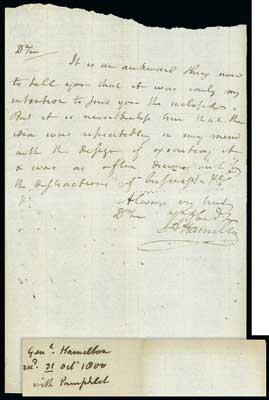 |
Hamilton, Alexander (1755-1804), West Indies-born soldier, lawyer and politician, Secretary and aide-de-camp to George Washington, 1st Secretary of the Treasury (1789-1795), co-wrote The Federalist Papers with James Madison and John Jay, killed in a duel by Aaron Burr. Autograph Letter Signed, one page, 5 x 8, no place, [late October, 1800]. To John Jay, then Governor of New York, in full:
"Dr Sir It is an awkward thing now to tell you that it was early my intention to send you the inclosed. But it is nevertheless true that the idea was repeatedly on my mind with the design of executing it & was as often driven out by the distractions of business— &c. Always very truly Dr Sir Yr Obedt Svt A. Hamilton"
Docketed on verso by Jay "Gen.l Hamilton, rec.d 31 Octr 1800 with pamphlet". Fine condition. Enclosed in a custom quarter-leather portfolio with historical background and an engraved portrait.
Estimate 2,000 - 3,000
AN EXCELLENT ASSOCIATION BETWEEN THE TWO GREAT LEADERS.
The "pamphlet" originally enclosed with this letter was Hamilton’ own Concerning the Public Conduct and Character of John Adams. Among his personal correspondence was a scathing letter regarding what he felt was Adams’ unsuitability as President. He was convinced that only the election of Charles C. Pinckney of South Carolina could save the nation and his party, the Federalists. Somehow Hamilton’s long-time political nemesis, Aaron Burr, obtained a copy of the letter and published excerpts from it. Hamilton, incensed, had the letter copyrighted and published in pamphlet form. In it Hamilton attacked Adams’ foreign policy and referred to the "disgusting egotism, the distempered jealousy and the ungovernable indiscretion of Mr. Adams’s temper".
View details and enlarged photo
|
Lot 243 |
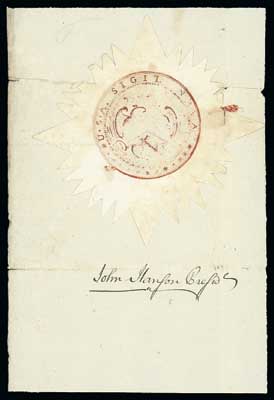 |
Hanson, John (1721-1783), Maryland signer of the Articles of Confederation, politician, President of the Continental Congress. Signature as President of the Continental Congress [Nov. 5, 1781-Nov. 3, 1782] cut from a larger [Naval] document, 5 x 7½. Clearly signed "John Hanson Presidt", below a paper seal affixed by red sealing wax. A Fine and rare autograph.
Estimate 2,000 - 3,000
The seal bears the legend "U.S.A. Sigil. Naval" and is that of the Board of Admiralty, the progenitor of the Navy Department. It was adopted by the Continental Congress on May 4, 1780 and was applied to all Naval Officer’s Commissions.
View details and enlarged photo
|
Lot 244 |
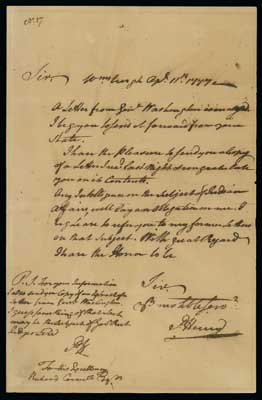 |
Henry, Patrick (1736-1799), Virginia lawyer, orator, Governor of Virginia (1776-1779, 1784-1786), declined Washington's nomination as Secretary of State (1795). In 1775, in a speech advocating that the Colonies prepare to defend themselves against the British, Henry uttered the immortal phrase, "Give me liberty or give me death!" Revolutionary War-date Autograph Letter Signed as Governor of Virginia, one page, 8 x 12½ Williamsburgh, April 11, 1777. To "His Excellency Richard Caswell Esq.r" [Governor of North Carolina], in full:
"Sir, W.mburgh Ap.l 11th 1777— A Letter from Gen.l Washington is inclosed. [sic] I beg you to send it forward from your state. I have the pleasure to send you a copy of a Letter I rec.d last night & congratulate you on its Contents. Any Intelligence on the subject of Indian affairs, will lay an obligation on me. I beg leave to refer you to my former Letters on that subject. With great Regard I have the Honor to be Sir, y.r most hble Serv.t P. Henry.
P.S. For your Information I also send you Copy of an Extract of a Letter from Gen.l Washington. I guess something of that Last may be the subject of Gov.r [of South Carolina John] Rutledges Line. P.H."
Fine condition with reinforcement of three horizontal folds.
Estimate 3,000 - 4,000
At this time the Indians were considered a serious threat to the Continental Army. Many of tribes had fought alongside the British during the French and Indian War (1754-1763), so during the American Revolution a large number of the estimated 200,000 Indians living east of the Mississippi again took the side of the British, who tended to want to protect the Indian lands, while the Americans seemed to want to take those lands for themselves. It is interesting to note that the only reference made to American Indians in the Declaration of Independence was to "merciless Indian savages".
View details and enlarged photo
|
Lot 245 |
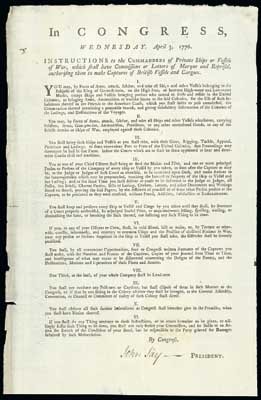 |
Jay, John (1745-1829), Jurist, politician, diplomat, President of Continental Congress (1778-1779), first Chief Justice of the U.S. Supreme Court (1789-1795), Governor of New York (1795-1801). Co-authored, with Alexander Hamilton and James Madison, "The Federalist Papers", a series of 85 articles written in 1787-1788, which are still a primary source for interpretation of the U.S. Constitution. Printed Document Signed, one page, 8½ x 13, no place, no date. "In Congress Wednesday. April 3, 1776. Instructions to the Commanders of Private Ships or Vessels of War, which shall have Commissions or Letters of Marque and Reprisal, authorising them to make Captures of British Vessels and Cargoes." with eleven separate paragraphs detailing procedures to be followed. Signed at the bottom next to the printed word "President". Fine condition with a few edge flaws, accompanied by an engraved portrait.
Estimate 1,000 - 1,500
There is no way to know exactly when Jay signed this copy. He may have done so at the time the law was passed, or when he was elected to the Presidency of Congress, December 10, 1778 (as the law was still in effect), or at any time between.
View details and enlarged photo
|
Lot 246 |
 |
Jenifer, Daniel of St. Thomas (1723-1790), Maryland lawyer, politician, delegate to the Continental Congress (1778-1782), signer of the U.S. Constitution. Manuscript Document Signed, one page, 6 x 1¾ [Philadelphia], December 31, 1779. Receipt for pay as a member of the Continental Congress for "Seven hundred and twenty seven pounds Ten Shillings my allowance on Journal Nov.r Session. [signed]Dan of S Thos Jenifer". Fine condition, cut from a payroll journal with similar document on verso signed by someone named "Mills". A rare signature.
Estimate 400 - 600
View details and enlarged photo
|
Lot 247 |
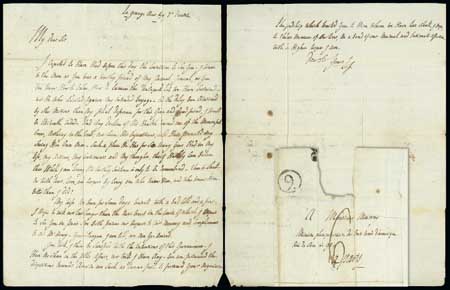 |
La Fayette, Marquis de (1757-1834), French nobleman, soldier and adventurer, joined the Continental forces as a Major General at the age of 20, in 1779 returned to France to solicit French aid for his new nation, after the War worked with U.S. Ambassadors to France, Franklin and then Jefferson, on behalf of America's interests. Autograph Letter Signed, "L.F.", 1¼ pages, 6½ x 8¼ La Grange [La Fayette’s estate] near Roy, 7th Ventose [February 25] [1800]. To William Vans Murray, U.S. Minister plenepotentiary, then in Paris to negotiate the France-Convention of 1800, in part:
"My Dear Sir. I expected to have had before this day the consolation to see you — I want it the more as you was a worthy friend of my Paternal General, as you know how to value, how to lament the unexpected Loss we have sustained. It is he who advised against my intended voyage. Had the delay been occasioned by other motives than my filial deference for this Great and Good friend, I would be miserable indeed. Had any decline of his health warned me of the mournfull event, nothing in the world, not even his injunctions, would have prevented my seeing him once more. Such a place he has for so many years had in my life, my actions, my sentiments and my thoughts, that I hardly can believe that while I am living his earthly existence is only to be remembered — That it shall be with tears, love, and respect by every one who knew him, and who knew him better than I did."
"…The friendship which united you to him whom we have lost shall, I hope, to the last moment of our lives, be a bond of our mutual and intimate affection. With the highest respect I am dear Sir Yours. L.F."
He also mentions the ongoing negotiations: "You will…be satisfied with the intentions of this Government. I have no share in the public affairs, nor will I have any - But I am persuaded the dispositions towards America are such as cannot fail to forward your negotiations."
With integral address leaf in La Fayette’s hand, docketed "M. La Fayette, Recd. 2 Mar. 1800 Paris". Minor splitting and small piece missing on blank edge of address leaf, mounting remnant where previously tipped to another sheet, Fine condition, enclosed in a custom quarter-leather portfolio with historical background and an engraved portrait.
Estimate 3,000 - 4,000
A HIGHLY DESIRABLE ASSOCIATION SHOWING THE CLOSE BOND LA FAYETTE FELT WITH WASHINGTON, WHOM HE NEVER SAW AGAIN AFTER THEIR FINAL PARTING IN 1784.
William Vans Murray (1760-1803) was frequently consulted by President Washington and advised him on the appointments of James McHenry as Secretary of War and Samuel Chase to the U.S. Supreme Court.
View details and enlarged photo
|
Lot 248 |
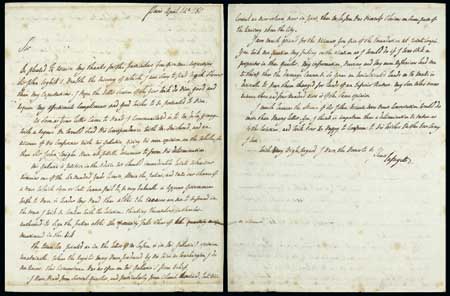 |
La Fayette, Marie Joseph Paul Yves Roche Gilbert du Motier, Marquis de (1757-1834), Autograph Letter Signed in English, 1½ pages, 7 x 9½ Paris, April 12, 1817. To John Cramer in Caën, Calvados [France] with integral address leaf in La Fayette's hand. First inquires into the health of Sir John Coghill followed by concerns regarding a land grant made to him by the U.S. Congress and referring to to the opinion of Albert Gallatin (1761-1849), who at the time of the letter was the U.S. Ambassador to France. Very Fine condition with some light foxing.
Estimate 1,000 - 1,500
In 1794 Congress had voted La Fayette a sum of $24,424 as his back pay as a General, for which he had refused any remuneration during the American Revolution. Plus, it was estimated that La Fayette had spent more than $200,000 of his own money in assisting the United States war effort, for which he never asked repayment. So in 1803 Congress voted him a grant of 11,520 acres which, when he eventually accepted the grant, were located in Lousiana. It is this land that he refers to in the letter. This letter was written after the French Revolution, which had destroyed his personal fortune.
View details and enlarged photo
|
Lot 249 |
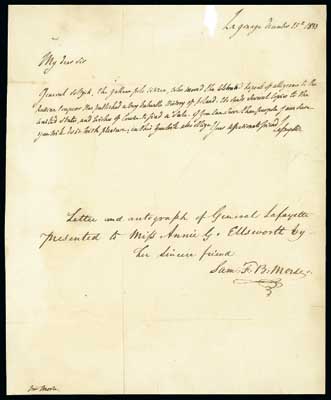 |
La Fayette, Marquis de (1757-1834), Autograph Letter Signed, one page, 7¼ x 8¾ La Grange, December 13, 1833. To friend Samuel F.B. Morse; with an integral Autograph Note Signed by Morse to Annie G. Ellsworth.
La Fayette writes Morse asking his assistance in selling copies of a History of Poland published by Polish general Roman Soltyk "…the gallant pole citizen, who moved the celebrated repeal of alligeance [sic] to the Russian Emperor…" signed "Your affectionate friend, Lafayette"
At the bottom of the same sheet Morse has written "Letter and autograph of General Lafayette presented to Miss Annie G. Ellsworth by her sincere friend Sam: F: B: Morse."
Small piece missing at top blank margin and a few fold breaks, laminated to another sheet of paper, nonetheless, clean and attractive.
Estimate 3,000 - 4,000
AN IMPORTANT DOCUMENT LINKING LAFAYETTE TO MORSE AND MORSE TO ELLSWORTH.
Morse, Samuel Finley Breese (1791-1872). Painter and Inventor, developed relay device to extend range over which telegraph signals could be sent, making the telegraph practical for long-distance use, developed "Morse" code, main founder and 1st president of National Academy of Design.
Morse first met La Fayette during the latter’s tour of the U.S. in 1824-25. At that time, Morse, a talented painter, produced two portraits of the French statesman.
Morse had attended Yale University with Annie Ellsworth’s father and was a close friend of the family. In 1843 it was Annie Ellsworth, her father now the U.S. Patent Commissioner, who brought Morse the news that Congress had appropriated the money for Morse’s intended telegraph line between Washington and Baltimore. Reportedly, at this time Morse promised her that she could compose the first message to be transmitted over the new line once completed; and it was, indeed, Annie Ellsworth who selected the Biblical quotation "What hath God wrought!" that was sent over the wire on May 24, 1844.
View details and enlarged photo
|
Lot 250 |
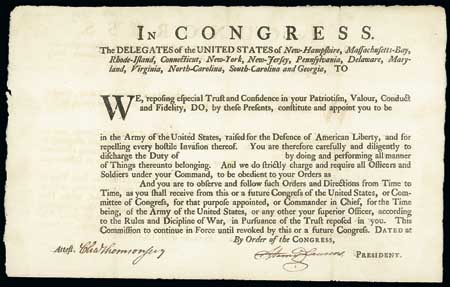 |
Laurens, Henry (1724-1792), South Carolina merchant, slave trader and planter, second President of the Continental Congress (1777-1778), signer of the Articles of Confederation. Printed Document Signed, one page, 13¼ x 8¼ blank Military Commission headed "In Congress. The Delegates of the United States of New-Hampshire, Massacustts-Bay, Rhode-Island, Connectict, New-York, New-Jersey, Pennsylvania, Dalaware, Maryland, Virginia, North-Carolina, South Carolina and Georgia, To…", signed in advance at the bottom "Henry Laurens" as President and "Cha Thomson Secy" [see lot 208] as witness. Fine condition.
Estimate 1,000 - 1,500
See lot 208 for reference to Charles Thomson.
View details and enlarged photo
|
Lot 251 |
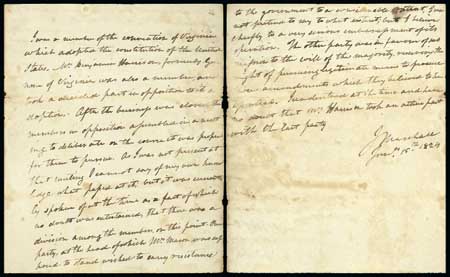 |
Marshall, John (1755-1835), Chief Justice of the U.S. Supreme Court (1801-1835), U.S. Congressman from Virginia (1799-1800), Secretary of State (1800-1801), principal founder of the American system of Constitutional law. Autograph Letter Signed, one and one-half pages, 6¼ x 7¾ no place, January 15, 1824. While Supreme Court Justice, Marshall writes to an unidentified person regarding his recollection of Virginia’s opposition to ratification of the U.S. Constitution, in full:
"I was a member of the convention of Virginia which adopted the constitution of the United States. M.r Benjamin Harrison formerly Governour of Virginia was also a member, and took a decided part in opposition to its adoption. After the business was closed the members in opposition assembled in a meeting to deliberate on the course it was proper for them to pursue. As I was not present at that meeting I cannot say of my own knowledge what passed at it; but it was currently spoken of at the time as a fact of which no doubt was entertained, that there was a division among the members on this poiint. One party, at the head of which M.r [George] Mason was supposed to stand wished to carry resistance to the government to a considerable extent. I cannot pretend to say to what extent; but I believe chiefly to a very serious embarrassment of its operation. The other party was in favour of submission to the will of the majority, reserving the right of pursuing legitimate means to procure those amendments which they believed to be essential. I understand at the time and have no doubt that M.r Harrison took an active part with the last party. J. Marshall. Jan.y 19th 1824."
Fine condition with light foxing and minor splitting, docketed on verso "Judge Marshall". Enclosed in a custom quarter-leather portfolio with historical background and an engraved portrait.
Estimate 3,000 - 4,000
AN EXCEPTIONAL HOLOGRAPHIC FIRST PERSON LOOK BACK AT AN IMPORTANT POLITICAL BATTLE DURING OUR NATION’S FORMATIVE YEARS.
The Virginia Constitutional Convention finally ratified the Constitution by a vote of 89-79. Had Virginia, or any one of the other key states of Massachusetts, New York or Pennsylvania, failed to ratify the Constitution, any efforts to put it into effect would have been greatly crippled.
View details and enlarged photo
|
Lot 252 |
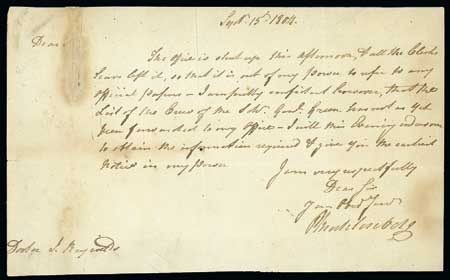 |
Muhlenberg, John Peter Gabriel (1746-1807), Virginia clergyman, General in Continental Army, post-war Vice-President of Pennsylvania under Franklin, U.S. Congressman and Senator from Pennsylvania. Autograph Letter Signed, one page, 8¾ x 5¼ [Philadelphia], September 15, 1804. Writing as Philadelphia Collector of Customs to a Dr. J. Reynolds, Muhlenberg writes, in part: "…I am fully confident…that the List of the Crew of the Sch. Genl. Green has not as yet been forwarded to my office…". Fine condition with minor flaws, accompanied by a small engraved portrait.
Estimate 150 - 200
View details and enlarged photo
|
Lot 253 |
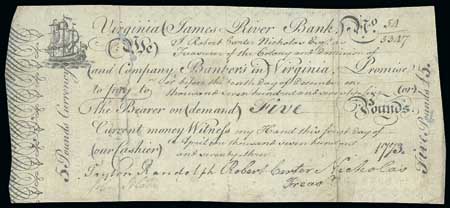 |
Randolph, Peyton (1721-1775), Virginia jurist, first President of the Continental Congress (1774-1775). Document Signed, 6¼ x 2¾ April 1, 1773. Signature as witness on a five-pound note drawn on the James River Bank of Virginia; also signed by Robert Carter Nicholas as the bank’s treasurer and faintly by John Blair; somewhat faulty but expertly silked on both sides and quite attractive.
Estimate 1,500 - 2,000
A RARE SIGNED DOCUMENT SIGNED BY RANDOLPH WHO DIED AT THE VERY BEGINNING OF THE BIRTH OF OUR NATION.
Blair was later a signer of the U.S. Constitution; Nicholas was the only member of the Virginia Assembly who voted against adoption of the Declaration of Independence.
View details and enlarged photo
|
Lot 254 |
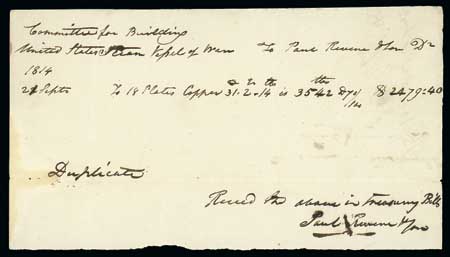 |
Revere, Paul (1735-1818), Boston silversmith, coppersmith, printer and patriot, instrumental in the Boston Tea Party, rode to Lexington to warn Hancock and Adams that British troops in Boston were preparing to move. Manuscript Document Signed, one page, 8 x 4½ no place, September 21, 1814. Purchase order from "The Committee for Building United States Steam Vessel of War" for 18 copper boiler plates weighing 3,542 lbs. from the firm of Paul Revere & Son at 70¢/lb. or a total of $2,479.40. Signed by Revere:
"Duplicate. Recied the above in Treasury Bills, Paul Revere & Son"
Fine condition, enclosed in a custom quarter-leather portfolio with historical background and an engraved portrait.
Estimate 3,000 - 4,000
The "Vessel of War" in the order was Robert Fulton’s Demologos. Her keel was laid on June 20, 1814, but she was not completed until June of 1815, four months after Fulton’s death. Revere first began supplying copper plates and sheeting to Fulton and his partner, Robert Livingston, in 1809, for Hudson River and New York ferry steamboats.
View details and enlarged photo
|
Lot 255 |
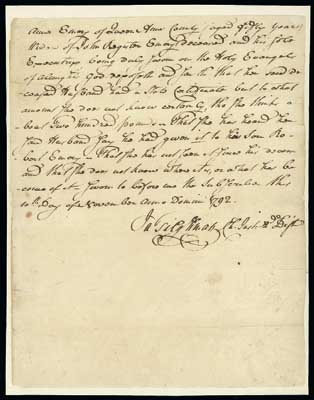 |
Tilghman, James (1716-1793), Maryland and Pennsylvania attorney, member of the Pennsylvania Provincial Council (1767) Autograph Document Signed, one page, 7¼ x 9, Centreville, Md., November 10, 1792. Sworn deposition taken by Tilghman of one Anne Emory regarding the estate of her late husband John Register Emory, boldly signed with flourishes "Ja Tilghman, Ch. Just. 2nd Dist." Fine condition, tipped to backing sheet with several repaired splits, accompanied by an engraved portrait.
Estimate 150 - 200
Despite the fact that Tilghman called for the repeal of the Acts of Parliament against which the American Colonists rebelled, he could not bring himself to support independence and strongly protested the Boston Tea Party. He was therefore considered a loyalist and in 1777 he was arrested by Pennsylvania authorities and imprisoned until 1778 when he was paroled to his estate on Maryland’s eastern shore.
View details and enlarged photo
|
|